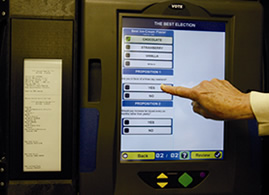NC Judges Resign Rather Than Perform Same-Sex “Marriages”
At least half a dozen family court magistrates have resigned in North Carolina after being told they must solemnize same-sex “marriages.”
Magistrates John Kallam, Gilbert Breedlove, Bill Stevenson, Tommy Holland, Gayle Myrick, and Jeff Powell have all tendered their resignation. Bill Stevenson told NBC,
“It was something I had to do out of conscience. I felt like to perform same-sex unions would be in violation of the Lord’s commands, so I couldn’t do that.”
Last month Gilbert Breedlove told reporters,
“[Resigning] was my only option. We were directed we had to perform the marriages, and that was just something I couldn’t do because of my religious beliefs.”
It has been speculated that other judges in North Carolina have decided to retire or resign for similar reasons, although they have not publicly given an explanation. According to Christian News, some North Carolina magistrates have said they simply will refuse to perform same-sex weddings–which could lead to their dismissal or litigation.
When Massachusetts became the first state to recognize same-sex marriage in 2004, many did not believe redefining marriage could ever affect people of faith. Ten years later the consequences are becoming all too clear. More and more everyday citizens are finding themselves in the difficult position of either violating their conscience or violating the law.
We have said before that as Americans we have an obligation to respect each others’ conscience. No one should have to choose between their job and their religious convictions.

 A few of you may have seen stories circulating late last week and this week about problems with electronic voting machines in Arkansas.
A few of you may have seen stories circulating late last week and this week about problems with electronic voting machines in Arkansas.